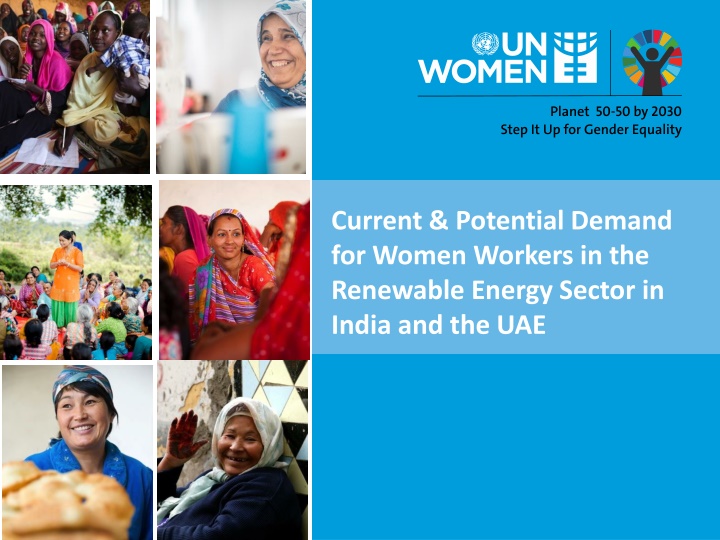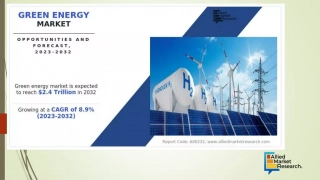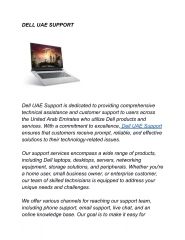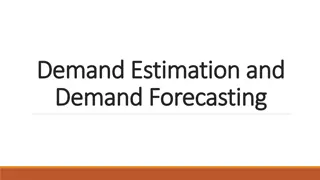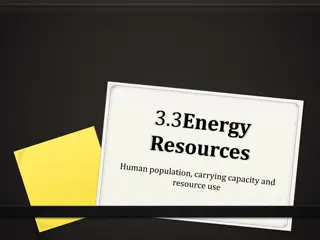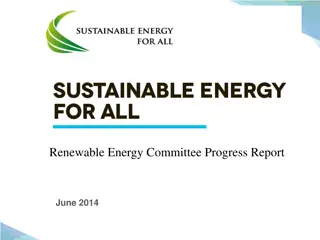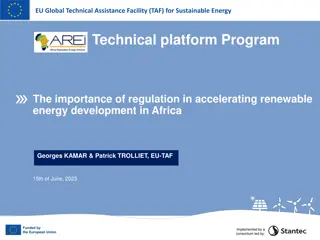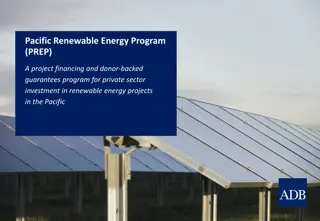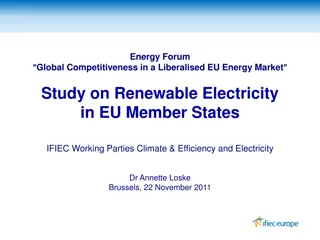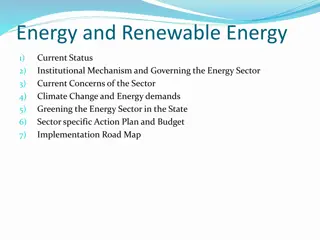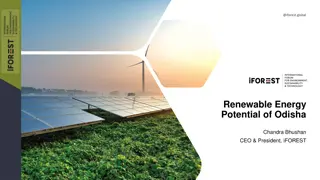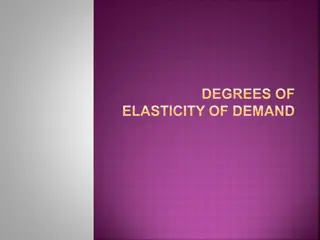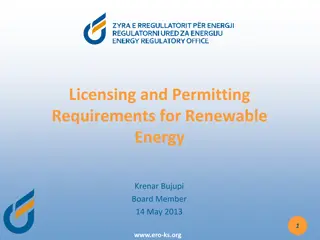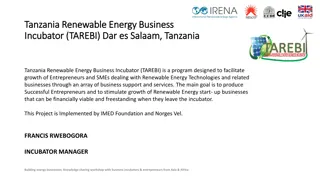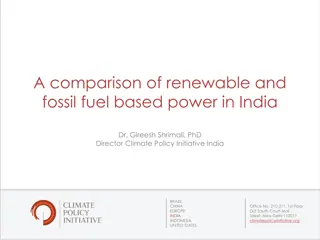Demand for Women Workers in Renewable Energy Sector in India and UAE
Analyzing the current and potential demand for women workers in the renewable energy sector in India and the UAE. Explore opportunities and challenges in achieving gender diversity in these growing industries.
Download Presentation

Please find below an Image/Link to download the presentation.
The content on the website is provided AS IS for your information and personal use only. It may not be sold, licensed, or shared on other websites without obtaining consent from the author.If you encounter any issues during the download, it is possible that the publisher has removed the file from their server.
You are allowed to download the files provided on this website for personal or commercial use, subject to the condition that they are used lawfully. All files are the property of their respective owners.
The content on the website is provided AS IS for your information and personal use only. It may not be sold, licensed, or shared on other websites without obtaining consent from the author.
E N D
Presentation Transcript
Current & Potential Demand for Women Workers in the Renewable Energy Sector in India and the UAE
Overview 1. Context for women s employment in India s & UAE s RE sector & professional MWWs in UAE s RE sector 2. Gendered features of local women s job demand & employment status in India s & UAE s RE sectors & professional MWWs in UAE s RE sector 3. Structural enablers & constraints to women s RE employment 4. Recommendations for action drawing on good practice
Context and Case for Womens RE jobs India s & UAE s dynamic transition to RE, driven by global/national factors and RE s multiple benefits, RE s positive job creation effect, especially for women Optimizing the emerging RE sector s potential & the, development benefits to society by harnessing women s potential Aligning with GEWR as a moral imperative that addresses/tailors response to the different/unequal realities of diverse groups of M/W to achieve SD
Gendered Features of Employment Demand & Status in RE Overall representation in RE and solar sub-sector W s share of overall RE work force relatively good globally & in UAE: G: 32%; & UAE: in 3 state-owned companies (ADNOC, DEWA, MASDAR) also focused on RE range 12-33 %, 2 private companies (Alcazar &YDE) 38% and 56% & in MOIE 59% & MOCCE: 59% But less so in India: 11% in rooftop solar; 21% in DRE in 3 public sector companies (NTPC, NHPC, SECI) also focused on RE range between 7-19 %; in 2 private companies Suzlon Energy & Tata Power between 5-8% Intentional targeting women + other factors seems to have paid off where deployed
Gendered Features of Employment Demand & Status in RE (overall representation contd) Solar PV highest (e.g. globally 40%), where DRE jobs important RE presence better than in oil/gas (G 32% vs 22%; I: 11% vs 10 %) However W s RE presence still largely lacks parity with men globally, in India and in UAE state-owned companies, and W s RE participation tends to be lower than their overall LFPR (eg G: 32% vs 47%; India 11%/21% vs 24%)
Gendered Features of Employment Demand & Status in RE (contd) Location in the Value Chain Gendered skill/occupational segmentation across RE value chains, but promise of GEWE in RE, in enabling environments Reasonable share of women with STEM/non-STEM technical skills in RE (G: 28% STEM skills, 35% non-STEM skills, 58% administrative; I: 25% of skilled work force in C &I solar DRE & 20 % in mini-grids -mostly office Reasonable share in some non-traditional segments of value chain (G: Solar PV over 35% :all segments, 47%:equip manufacture, 37%: project devpt; I: rooftop solar: 18 % project design/pre-construction
Gendered Features of Employment Demand & Status in RE (location in Value Chains contd) STEM & non-Stem technical presence esp of MWWs data/computer sciences, data analytics, in strategy, project design, business development and sustainability, (commercial intelligence, site assessment, marketing, external customer relations), finance/accounting, administration, human affairs/tax compliance, and increasingly in office-based engineering teams. resources, communications, legal India DRE- sales agents/distributors & egs of W handling male functions in textiles/food/handicrafts using RE products/ services Poor representation in onsite business deployment (G: 12% Solar PV installation; I: rooftop solar 3% construction/commission; 1% OM, UAE: MMWs ) On-site visits by women corporate strategy, data analytics, engineering teams
Gendered Features of Employment Demand & Status in RE Leadership Positions Low share generally (2019: G: 10.8% vs 12.1% oil/gas &15.5% in non- energy; I: rooftop solar 12% senior & 17% mid management unit/dept heads in support function divs) Better indicators for UAE (30% in the public sector, 15 % on Board of UAE Chambers of Commerce and Industry, 18 to 23% in UAE s 3 state-owned RE companies) Hard glass ceiling at senior-most levels (2019 G: 5%; I: 1/3 rooftop solar businesses & none with more than 1 board member) Enabling Conditions can break this: (I: Tata Power 20% on BoD; ADNOC 3 VPs across the group)
Gendered Features of Employment Demand & Status in RE Wages & Other Work Concerns Wage gaps (G: 20% less than men;) Gender biases in access to capital and company ownership, include how much capital women get for the same dilution in ownership compared to a male-led company or how women negotiate the terms of the equity they bring in. Poor retention Poorer career progression relative to men
Professional Migrant Women in UAEs RE sector Professional MW dominate RE private sector, & Emirati women the public sector. Work in firms that develop RE assets at utility scale, in sustainable infrastructure funding companies, in EPC turn-key companies, in consultancy firms providing business, legal, RE technical services to companies to help them decarbonize. High-skilled professionals with non-STEM/STEM expertise, in mid/senior management positions in non-technical/technical roles: partners, regional/ country heads, division/team leads, senior technical advisers or mid/junior technical specialists.
Professional Migrant Women in UAEs RE sector Most in corporate office: corporate strategy development, business development, finance, HR, legal, sales/marketing, communications, administration. Less involved in project execution but W from engineering or business development teams undertake on-site visits with engineering functions as part of their jobs. Most blue-collar workers on-site are male migrants, in semi- skilled technical work or low-skilled construction. Some companies are looking at more W in on-site project execution via policies/agreements with their supply chain partners
Challenges to Womens RE Employment Recruitment Gendered & other perceptions about the sector & its work Gendered perceptions/and practice about women s location in RE value chains and related infrastructure and protections. Gender biases in company employment, recruitment policies/practices, and in application processes. Gender disparities in tertiary education and TVET for RE jobs. Inadequate embedment of RE program in core curriculum, thin alignment between education and RE industry demands
Challenges to Womens RE Employment (contd) Recruitment (contd) Women s unequal access to entry points for RE jobs Women s greater lack of access to adequate information on RE job opportunities
Challenges to Womens RE Employment (contd) Retention & Career Advancement into Leadership Roles Marriage, child-bearing/raising & other unpaid care work Inadequate protections & entitlements at work Gender perceptions/practice on women s upward mobility The leaking pipeline & the glass ceiling
Recommendations for Action Enshrine gender equality provisions in national constitutions & corporate mandates in line with CEDAW and ILO standards Generate national labor force, company/industry data on women-owned RE businesses & employee representation in the RE sector by sub-sector, occupation, education, skill and wage levels - disaggregated by sex, age, nationality and migration status, at minimum Design, implement, monitor and evaluate evidence-based policies, plans and programs, underscored by affirmative action for women, and backed by gender responsive targets, indicators and budgets on the following: -Non-discriminatory enrollment, retention, graduation from RE-related TVET and tertiary STEM education, including in non-traditional streams, -Non-discriminatory recruitment of women into RE jobs including non- traditional STEM jobs through an array of strategies
Recommendations for Action Decent and productive RE employment including provisions for Minimum wages, equal pay/entitlements for work of equal value Equal representation of women with men at all levels of organizations and in all segments of RE value chains; and access to promotions Paid maternity/paternity and/or parental leave of reasonable duration and work-life balance measures, including for child and other care responsibilities without compromising career tracks General and occupational health, safety and well-being, including prevention of sexual harassment/abuse and related remedies. The right to associate and collective bargaining.
Recommendations for Action Additional measures for Migrant Women Employees/Workers Harmonization of labor laws with migration and other legal regimes; More legal migration pathways for women migrant workers; Harmonized worker-employer skills matching and skills-based mobility for migrant women aligned with labor market demand, including in non-traditional areas Fair and accountable recruitment processes that are accessible to and protect low skilled migrant women workers, especially where online recruitment is increasing; and Effective bilateral labor agreements and MOUs with robust protections, backed by strong monitoring and enforcement mechanisms.
Recommendations for Action Additional Measures for RE Companies Retention and career progression through inclusive safe workplace cultures: Onboarding, safe spaces and collectives for women, GE training in companies Clear communication on career pathways to all employees; Equal opportunities, conditions and access to professional training, mentors and sponsors with similar levels of competence, seniority and influence as those for men, Fair and comprehensive performance assessment feedback to female employees that factors in women s concerns with solutions, & allows avenues for women to disagree;
Recommendations for Action Accountability Ensure gender equality performance incentives to employees; Report by companies on their gender equality mandates, & implementation of related workplans with targets/ indicators
